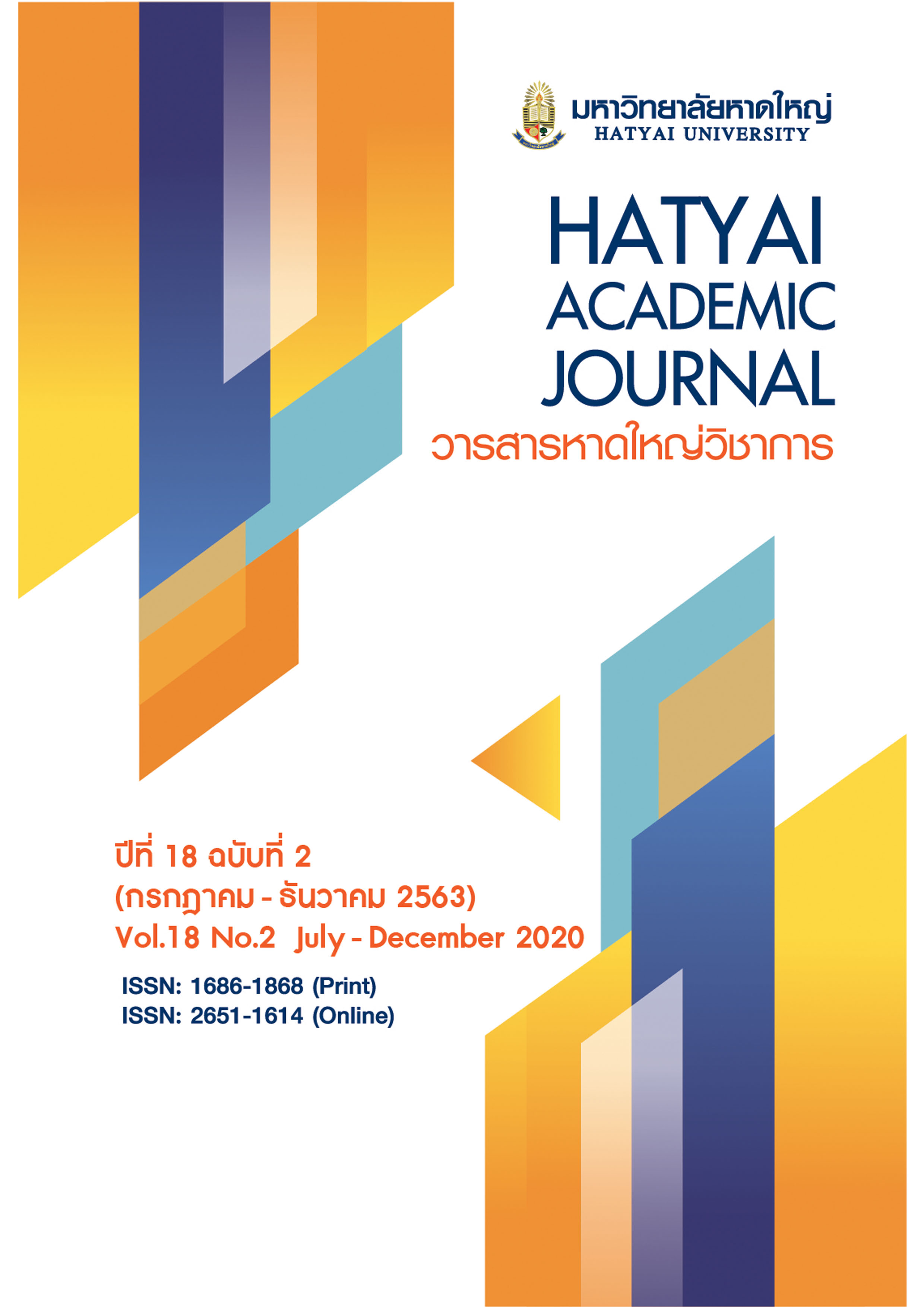The Factors Affecting the Reconciliation Thinking of Students in the Southern Border Provinces of Thailand
Main Article Content
Abstract
The purpose of this descriptive research was to study the factors affecting reconciliation thinking of students in the Southern Border Provinces of Thailand. The samples were 300 students, randomized by multi-stage random sampling. Data were collected by using reconciliation thinking questionnaires. Statistical analysis used was Correlation and Stepwise Multiple Regression.
The results were summarized as follows: 1) the attitudes towards reconciliation thinking, mental health, social experiences, religious approaches, social support, future orientation with self-control, self-esteem, and achievement motivation were found positively correlated with reconciliation thinking. They were significantly different at the .01 level. 2) Seven predictors could predict the reconciliation thinking of the students with a statistical level of significance at .01. The predictors had a predictability power of 65.30 % and a predictive standard error of 0.24. 3) The prediction equations in the raw score and standard scores were as follows:= 0.977 + 0.332X1 + 0.174X3 + 0.131X5 + 0.042X2 + 0.119X8 - 0.090X6 + 0.071X4
= 0.395Z1 + 0.263Z3 + 0.165Z5 + 0.085Z2 + 0.140Z8 - 0.112Z6 + 0.104Z4
Article Details
All published articles are evaluated by three qualified peer reviewers from various institutions through a double-blind process, where reviewers do not know the authors’ identities and authors do not know the reviewers’ identities. The content and articles in the Hatyai Academic Journal reflect the authors’ views only and are neither the opinions of the editorial board nor the responsibility of Hatyai University. The Editorial Board of the Hatyai Academic Journal allows articles to be reproduced for academic purposes, on the condition that the original source is clearly cited.
References
Bhanthumnavin, D. (1995). Ethical tree theory: Personnel research and development. Bangkok: National Institute of Development Administration. [in Thai]
Chareonwongsak, K. (2008). Reconciliation must begin at kindergarten. Retrieved from http://www.kriengsak.com/node/1669 [in Thai]
Danielsen, A. G. (2009). School-related social support and students’ perceive life satisfaction. The Journal of Educational Research, 102(4), 303-320.
Facione, P. A., & Facione, N. C. (1998). Critical thinking: Assessment ideas. Millbare, CA: The California Academic Press.
Hair, J. F., Black, W. C., Babin, B. J., & Anderson, R. E. (2010). Multivariate data analysis: A Global Perspective (7th ed.). Upper Saddle River, NJ: Pearson Education.
Hasamoh, A. (2009). Muslims identity in Rueso Community: Southernmost Provinces of Thailand. Journal of Humanities and Social Sciences, 5(2), 203-230.
Jitmoud, S. (2006). The 3 southernmost provinces: From problem to reconciliation (Master’s thesis). Chulalongkorn University, Bangkok. [in Thai]
Kohlberg, L. (1976). Moral stages and moralization: The cognitive development approach. In T. Lickona (Ed.), Moral development and behavior (pp. 31-55). New York: Holt, Rinehart and Winston.
Kowatrakul, S. (1998). Educational psychology. Bangkok: Chulalongkorn University. [in Thai]
Meekun, K. (2004). Method of measuring moral reasoning by using the rating scale methods developed for use with adults. In Seminar productivity of Thai behavioral system to problem solving youth. Miracle Grand Convention Hotel, Bangkok. [in Thai]
Ministry of Education. (2003). Research report on reconciliation index and caring for Thai society by using delphi technique. Bangkok: Department of Academic Affairs. [in Thai]
Pinpradit, N. (2014). An empirical study of prudent social trust indicator system among undergraduate in The 3 Southernmost Provinces (Research Report). Khon Kaen: Khon Kaen University. [in Thai]
Princess of Naradhiwas University. (2017). Division of academic and affair office. Retrieved from http://academic.pnu.ac.th/ [in Thai]
Prince of Songkla University. (2017). Education services division. Retrieved from http://regist.pn.psu.ac.th/main/ [in Thai]
Promphakping, B., & Sirithorn, P. (2005). How to reconciliation to problem solving with non-violence. Khon Kaen: Khon Kaen University. [in Thai]
Rascha, T. (2013). A Model of developing reconciliation thinking for the student teachers at Prince of Songkla University (Doctoral dissertation). Khon Kaen University, Khon Kaen. [in Thai]
Rogers, D. (1978). The psychology of adolescence. New York: Appleton Century-Crofts.
Satha-Anand, C. (2005). Peaceful ways in the Three Southern Border Provinces of Thailand: understanding the reconciliation concept. Retrieved from http://www.midnightuniv.org/midnight2545/ document9540.html [in Thai]
Samanpan, T. (2006). The Effect of using an Instructional model emphasizing citical thinking processes and flexible learning on developing critical reading ability in english (Doctoral dissertation). Khon Kaen University, Khon Kaen. [in Thai]
Sangmanee, R. (2001). The Development of general education courses to enhance mutual understanding for Higher Education Institutions in the Southern Border Provinces (Doctoral dissertation). Sukhothai Tammathirat Open University, Nonthaburi. [in Thai]
Stanish, B. & Eberle, B. (1997). Be a problem solver. Waco, TX: Prufrock Press.
Siamwalla, A. (2007). Conflict between development and society in 3 Southernmost Province. Bangkok: Nolas Plus.
The National Reconciliation Commission. (2006). Report of the National Committee for Reconciliation (Governing Body): Overcoming violence with reconciliation power. Bangkok: Cabinet and Royal Gazette Publishing Office. [in Thai]
Wannaviriyawat, N. (2009). Buddhist style administration in Pra Priyattidhama Schools Mueang Chiang Mai District (Master’s thesis). Chiang Mai University, Chiang Mai. [in Thai]
Wiratchai, N. (2012). Accurate and modern methods for determining sample size. In the Research Zone Project. National Research Council of Thailand. Retrieved from http://lllskill.com/web/files/GPower.pdf [in Thai]
Wustenberg, K. R. (2009). The political dimension of reconciliation: A theological analysis of ways of dealing with guilt during the transition to democracy in South Africa and (East) Germany. Berlin: Win. B. Eerdmans Publishing.
Yala Rajabhat University. (2017). Academic service division. Retrieved from http://eduservice.yru.ac.th/newweb/ [in Thai]


